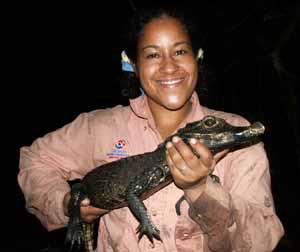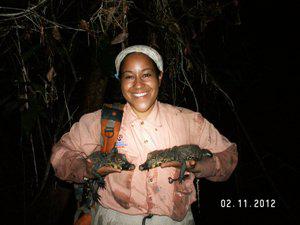Nicole Limunga Smolensky
The aims of my research are to assess the conservation status of dwarf crocodiles in Cameroon via phylogeography, estimation of population size and structure, and investigations of hunting pressure.

The African dwarf crocodile is hunted primarily for food, but also for low-grade leather products throughout west and central Africa. Effective conservation measures and sustainable hunting programs require knowledge of species’ distribution, population ecology and hunting pressure. Recent evidence suggests this species is part of a cryptic species complex, comprising three or four species however the geographic distribution of each species is undetermined. Previous research suggests possible boundaries may lie in or around Cameroon.

One aim of my research is to determine if multiple species are present in the country and identify landscape features that shape the genetic structure in order to identify evolutionary significant units for conservation. Dwarf crocodiles are protected by law in Cameroon, but they can still constitute a significant portion of the biomass of hunted species. Often the unregulated use of crocodilian species is unsustainable but with little information about the population size and demography of dwarf crocodiles throughout Cameroon it is difficult to determine the sustainability of hunting.
A second aim of my research is to provide baseline population estimates for several dwarf crocodile populations throughout the country and explore the effects of hunting pressure on a population in the Campo Ma’an National Park. I will take a phylogeographic and landscape genetic approach to explore the genetic structure of populations. I will use a combination of standard crocodile survey techniques to explore population size and demographic structure, and I will conduct interviews with hunters to investigate hunting pressure.
This research will provide the first population abundance estimates of dwarf crocodiles for several areas in Cameroon. The results from the hunting pressure study in conjunction with the population estimates will represent an important first step toward improving our understanding of the regional conservation status of dwarf crocodiles. The genetic studies will also assist conservation practitioners in identifying suitable donor and recipient populations for conservation measures such as translocations or re-introductions.